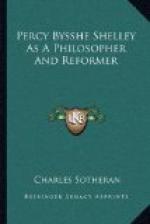“And
then I clasp’d my hands, and look’d around;
But
none were near to mock my streaming eyes,
Which
pour’d their warm drops on the sunny ground.
So,
without shame, I spake: ’I will be wise,
And
just, and free, and mild, if in me lies
Such
power; for I grow weary to behold
The
selfish and the strong still tyrannize
Without
reproach or check.’ I then controll’d
My tears; my heart grew calm;
and I was meek and bold.
“And
from that hour did I, with earnest thought,
Heap
knowledge from forbidden mines of lore;
Yet
nothing that my tyrants knew or taught,
I
cared to learn; but from that secret store
Wrought
linked armor for my soul, before
It
might walk forth, to war among mankind.
Thus,
power and hope were strengthen’d more and more
Within
me, till there came upon my mind
A sense of loneliness, a thirst
with which I pined.”
The fruits born of this seed are discernible in every line of his works. While having all reverence for his college companions, Aristotle, Aeschylus, and Demosthenes, his mind instinctively turns towards the deemed heretical works of the later French philosophers, D’Holbach, Condillac, La Place, Rousseau, the encyclopaedists, and other members of that school. His intellect he furbishes with stores of logic and of chemistry, in which his greatest love was to experimentalize; of botany and astronomy, in which he was more than a mere adept; from Hume, too, whose essay on “Miracles,” wrong as it is in the main on many important points, was one of the alphas of his creed—and with deep draughts from his great instructor, Plato, of whom he always spoke with the greatest adoration, as, for instance, in the preface to the Symposium:
“Plato is eminently the greatest among the Greek philosophers; and from, or rather perhaps through him and his master, Socrates, have proceeded those emanations of moral and metaphysical knowledge, on which a long series and an incalculable variety of popular superstitions have sheltered their absurdities from the slow contempt of mankind.”
It is desirable to call attention to the great minds from whom the student of the early part of this century could only cull his knowledge—he had no Spencer and no Mill, at whose feet to sit—he had in science none of the conclusions of Darwin, of Huxley, of Tyndall, of Murchison, of Lyell, to refer to, and yet I think, that the careful reader will, like myself, find prefigured in Shelley’s works much of that of which the world is in full possession to-day, and which the mystical Occultists, Rosicrucians, and Cabalists have now, and have ever had, conjoined to a mysterious command over the active hidden material and spiritual powers in the infinite domain of nature.




